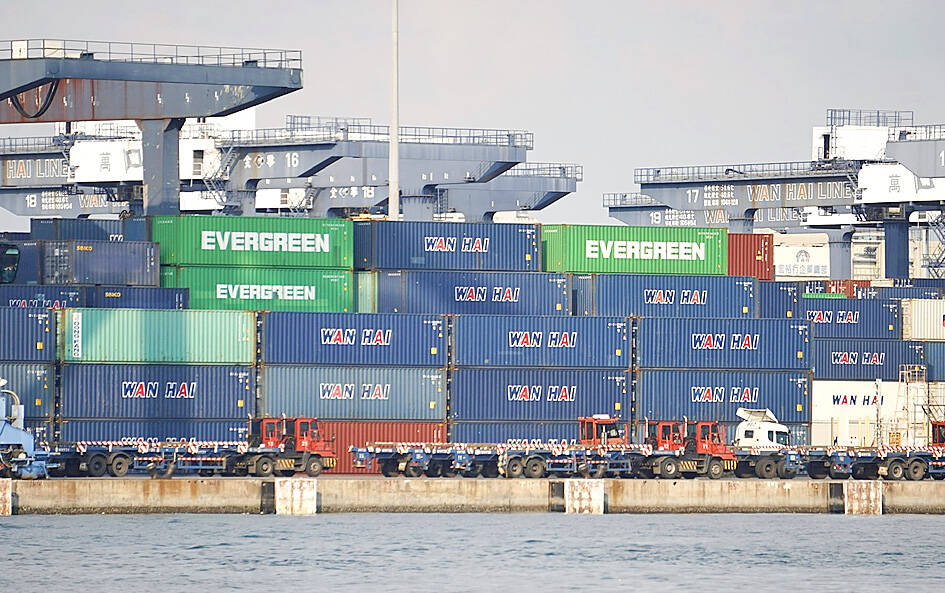Taiwan’s exports to Mexico surged to a record level as tech companies moved production out of China, but the trade now faces uncertainty following US threats of higher tariffs on its neighbor.
Taiwanese exports to Mexico jumped 479 percent last month from a year earlier to reach US$2.7 billion, official data showed. This is mainly driven by shipments of graphic processing units, a key components of artificial intelligence (AI) servers.
The Ministry of Finance in a statement on Friday said the surge was largely due to supply chain shifts, as companies like Hon Hai Precision Industry Co (鴻海精密) — also known as Foxconn Technology Group (富士康科技集團) — and Wistron Corp (緯創) have been building factories in Mexico to assemble AI servers destined for the US.
 Cargo containers are pictured stacked at the Port of Kaohsiung on April 30 last year. Photo: CNA
Cargo containers are pictured stacked at the Port of Kaohsiung on April 30 last year. Photo: CNA
The trade now seems at risk after US President Donald Trump announced late last month that he would impose 25 percent tariffs on imports from Mexico and Canada. The decision was later delayed for 30 days after last-minute negotiations, but the threats have caused stock prices of Taiwanese tech companies to plunge.
Last month, Trump also announced plans to impose 100 percent tariffs on computer chips from Taiwan. Minister of Economic Affair J.W. Kuo (郭智輝) on Saturday said that a group of officials would travel to the US to meet with Trump administration officials to try and stop the tariffs from being implemented.
In addition, Taiwan is preparing to buy more liquefied natural gas (LNG) from the US to reduce its trade surplus and potentially avoid higher tariffs.
State-owned CPC Corp, Taiwan (CPC, 台灣中油) and the ministry are in negotiations with an Alaska-based export plant for supplies, state-run Central News Agency reported on Sunday, citing an unidentified ministry official.
Trump on Friday said Japan would buy a record volume of US LNG, following a meeting with Japanese Prime Minister Shigeru Ishiba at the White House.
Last year, Taiwan imported about 10 percent of its LNG from the US, with most shipments arriving from Australia and Qatar under long-term supply contracts, official data showed.

 www.taipeitimes.com
www.taipeitimes.com
Taiwanese exports to Mexico jumped 479 percent last month from a year earlier to reach US$2.7 billion, official data showed. This is mainly driven by shipments of graphic processing units, a key components of artificial intelligence (AI) servers.
The Ministry of Finance in a statement on Friday said the surge was largely due to supply chain shifts, as companies like Hon Hai Precision Industry Co (鴻海精密) — also known as Foxconn Technology Group (富士康科技集團) — and Wistron Corp (緯創) have been building factories in Mexico to assemble AI servers destined for the US.

The trade now seems at risk after US President Donald Trump announced late last month that he would impose 25 percent tariffs on imports from Mexico and Canada. The decision was later delayed for 30 days after last-minute negotiations, but the threats have caused stock prices of Taiwanese tech companies to plunge.
Last month, Trump also announced plans to impose 100 percent tariffs on computer chips from Taiwan. Minister of Economic Affair J.W. Kuo (郭智輝) on Saturday said that a group of officials would travel to the US to meet with Trump administration officials to try and stop the tariffs from being implemented.
In addition, Taiwan is preparing to buy more liquefied natural gas (LNG) from the US to reduce its trade surplus and potentially avoid higher tariffs.
State-owned CPC Corp, Taiwan (CPC, 台灣中油) and the ministry are in negotiations with an Alaska-based export plant for supplies, state-run Central News Agency reported on Sunday, citing an unidentified ministry official.
Trump on Friday said Japan would buy a record volume of US LNG, following a meeting with Japanese Prime Minister Shigeru Ishiba at the White House.
Last year, Taiwan imported about 10 percent of its LNG from the US, with most shipments arriving from Australia and Qatar under long-term supply contracts, official data showed.

Exports to Mexico jumped almost 500% last month - Taipei Times
Bringing Taiwan to the World and the World to Taiwan
